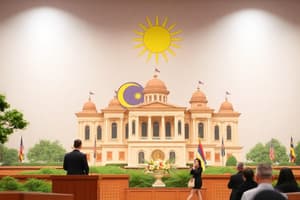Podcast
Questions and Answers
Which of the following rights is explicitly recognized in Malaysia's Constitution?
Which of the following rights is explicitly recognized in Malaysia's Constitution?
- Right to political assembly
- Right to private ownership
- Right to social welfare
- Freedom of expression (correct)
What does the principle of sovereignty in Malaysia allow the country to do?
What does the principle of sovereignty in Malaysia allow the country to do?
- Intervene in the affairs of other countries
- Follow international laws without exception
- Transfer all powers to international organizations
- Maintain the highest authority and freedom from external interference (correct)
What is required for a bill to become law in Malaysia after being presented in Parliament?
What is required for a bill to become law in Malaysia after being presented in Parliament?
- Approval from the public through a referendum
- Review by the United Nations
- Consensus from political parties in opposition
- Consent from the Agong after approval by both Houses (correct)
What is a key characteristic of Malaysia's system of governance?
What is a key characteristic of Malaysia's system of governance?
When was the current Constitution of Malaysia formulated?
When was the current Constitution of Malaysia formulated?
Study Notes
Prinsip Kedaulatan
- Kedaulatan merujuk kepada kuasa tertinggi dan kebebasan sesebuah negara untuk mengatur hal ehwalnya tanpa campur tangan luar.
- Kedaulatan negara Malaysia diakui oleh undang-undang antarabangsa dan termaktub dalam Perlembagaan.
- Malaysia mengamalkan kedaulatan bersyarat, di mana hak-hak tertentu mungkin dipindahkan kepada organisasi antarabangsa dalam konteks kerjasama.
Hak Asasi Manusia
- Malaysia mengiktiraf hak asasi manusia melalui Perlembagaan, terutamanya dalam Bahagian II yang memperuntukkan hak-hak asasi.
- Hak-hak termasuk kebebasan bersuara, hak untuk beragama, dan hak untuk mendapatkan pendidikan.
- Namun, terdapat batasan yang dikenakan untuk menjaga keselamatan negara, ketertiban awam, dan moral.
Sistem Pemerintahan
- Malaysia mengamalkan sistem pemerintahan demokrasi berparlimen dengan Raja sebagai Ketua Negara.
- Terdapat tiga cabang pemerintahan: Eksekutif (Kementerian), Legislatif (Parlimen), dan Judisiari (Mahkamah).
- Parlimen terdiri daripada Dewan Rakyat dan Dewan Negara; anggota Dewan Rakyat dipilih melalui pilihan raya umum.
Proses Perundangan
- Proses perundangan melibatkan cadangan undang-undang yang dikenali sebagai "rang undang-undang".
- Rang undang-undang dibentangkan di Parlimen, dibahaskan, dan perlu diluluskan oleh kedua-dua Dewan.
- Setelah diluluskan, rang undang-undang perlu mendapat perkenan Agong sebelum menjadi undang-undang.
Sejarah Perlembagaan Malaysia
- Perlembagaan Malaysia dibentuk selepas kemerdekaan pada tahun 1957, berasaskan Perlembagaan Persekutuan Tanah Melayu 1948.
- Terdapat beberapa pindaan yang dilakukan, terutamanya pada tahun 1963 dengan pembentukan Malaysia.
- Perlembagaan kini mengandungi 15 bahagian yang merangkumi pelbagai aspek seperti struktur pemerintahan, hak asasi, dan keistimewaan orang Melayu dan bumiputera.
Principle of Sovereignty
- Sovereignty refers to the highest power and freedom of a country to manage its affairs without external interference.
- Malaysia's sovereignty is recognized by international law and enshrined in the Constitution.
- Malaysia practices conditional sovereignty, allowing for certain rights to be transferred to international organizations in the context of cooperation.
Human Rights
- Malaysia recognizes human rights through the Constitution, particularly in Part II, which outlines fundamental rights.
- Key rights include freedom of speech, right to religion, and right to education.
- Limitations exist to ensure national security, public order, and morality are maintained.
Government System
- Malaysia operates under a parliamentary democracy with a King as the Head of State.
- The government comprises three branches: Executive (Ministries), Legislative (Parliament), and Judiciary (Courts).
- Parliament consists of the House of Representatives and the Senate; members of the House of Representatives are elected through general elections.
Legislative Process
- The legislative process involves the proposal of laws known as "bills."
- Bills are presented in Parliament, debated, and must be approved by both Houses.
- Once approved, a bill requires the King's assent before it becomes law.
History of the Malaysian Constitution
- The Malaysian Constitution was established following independence in 1957, based on the Federation of Malaya Constitution of 1948.
- Several amendments have been made, particularly in 1963 with the formation of Malaysia.
- The Constitution now contains 15 parts addressing various aspects including governance structure, human rights, and privileges of Malays and indigenous peoples.
Studying That Suits You
Use AI to generate personalized quizzes and flashcards to suit your learning preferences.
Description
This quiz explores the principles of sovereignty and human rights as recognized in Malaysia's Constitution. It covers Malaysia's democratic governance system and the relationship between national sovereignty and international cooperation. Test your knowledge on these essential aspects of Malaysian governance.




